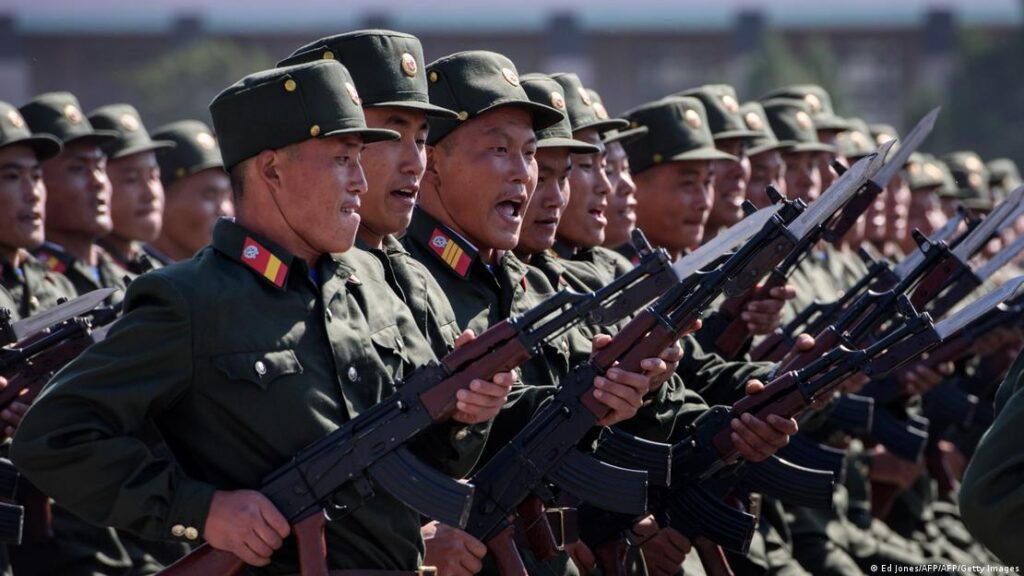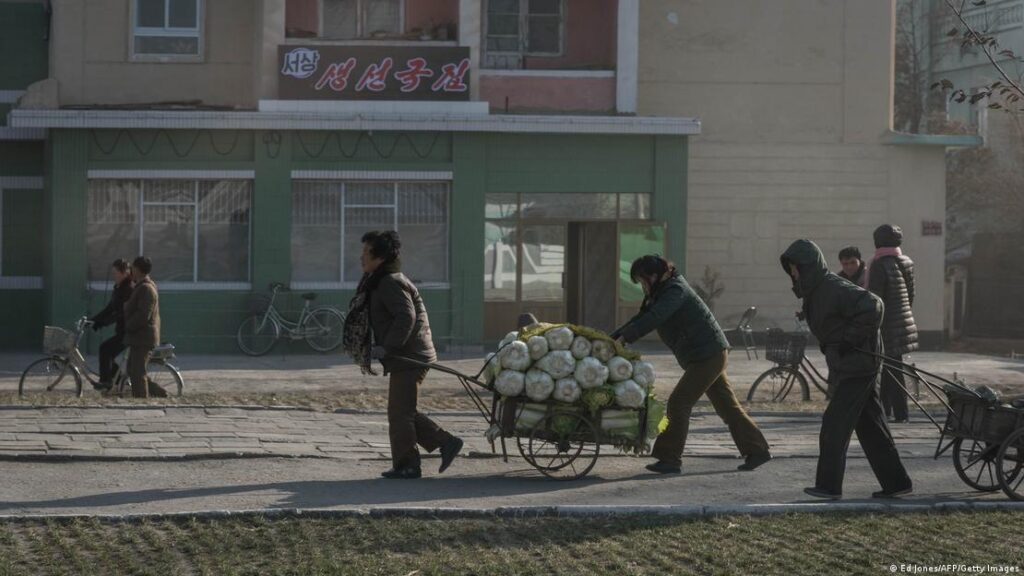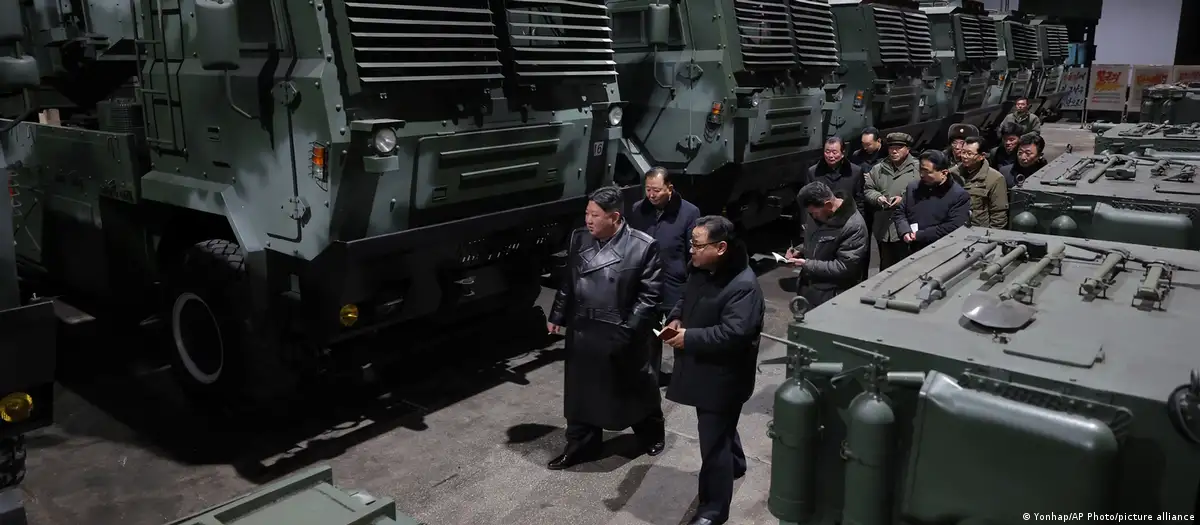The world’s most isolated country is expected to return to growth for the first time in five years as arms shipments to support Russia’s invasion of Ukraine continue apace.
(DW) North Korea, the world’s most isolated country, is expected to resume economic growth this year for the first time since the last five years, as arms shipments to support Russia’s invasion of Ukraine fill state coffers.
Since August, North Korea has made ten arms shipments, sending around one million cartridges to Russia, according to South Korea’s National Intelligence Service. Other reports, based on US satellite images, suggest that Pyongyang has also delivered ballistic missiles to the Russian military.
Both Pyongyang and Moscow have denied that the shipments took place.
The secret deal between North Korean leader Kim Jong-un and Russian President Vladimir Putin is likely to further boost the Asian country’s small centrally planned economy which, according to South Korea’s central bank, reached just 24.5 billion dollars in 2022.
Profitable pact
Not only have the Covid-19 lockdowns impacted the already weak North Korean economy, causing it to fall by 4.5% in 2020, but the international sanctions imposed in 2016 over Pyongyang’s nuclear program had already damaged vital coal exports to China. The two crises have further exacerbated the difficulties in a country where 60% of the population lives below the poverty line.
“The economy has been in decline for the last five years. Therefore, the arms deal with Russia will help return to positive growth of around 1% in 2024,” Anwita Basu, director of country risk for Europe at Fitch Solutions, the research arm of ratings agency Fitch, told DW.
Basu says her prediction is an assumption, as Pyongyang does not release economic data. Most statistics on the country are obtained from South Korea’s central bank and North Korea’s trading partners.
Last year, North Korea’s trade with China – by far its biggest partner – returned to pre-pandemic levels of 2.3 billion dollars, according to Beijing, having fallen dramatically between 2016 and 2018 following the imposition of sanctions.
Describing the transfer of ammunition as a “mega deal” for Pyongyang, Basu said that this was clearly an “act of desperation” on the part of Russia, which is increasingly isolated globally due to the decision to invade its neighbor.
A report published in October by the British Royal United Services Institute (Rusi), the world’s oldest defense and security think tank, said that Pyongyang’s decision to deliver ammunition to Russia “underscores the grave threat North Korea poses to international security,” warning that the deal would have “profound consequences for the war in Ukraine and the security dynamic in East Asia.”

War industry as an engine of growth
North Korea’s war industry is one of the country’s largest employers, employing around 2 million workers out of the country’s 26 million inhabitants. The sector has contributed significantly to the economy, along with agriculture.
Originally, the sector served as a supplier only to its own Armed Forces, but North Korea has found some important customers abroad for its weapons and ammunition – mostly former Soviet countries or sub-Saharan Africa. Most of the parts are imported from other highly sanctioned countries, including China and Iran.
“North Korea has wanted two things for some time: one is legitimacy as a nation, which it doesn’t have because the Korean War isn’t over yet. The second is a sustainable defense and military sector, capable of defending its sovereignty,” said Basu.
Despite the importance of the defense sector, Basu is skeptical about whether ordinary North Koreans will benefit from the Russian arms deal. For many years, the country has relied heavily on foreign aid to feed its population, and many people suffer from malnutrition and other health problems.
“It’s likely that they [ordinary citizens] won’t gain much, because North Korea remains an autocratic state with a lot of corruption,” she said. “At the same time, the additional income for the defense sector will improve external financing capacity, so access to food and technology imports could become easier.”
The state is expected to profit by at least 1 billion dollars from the sale of artillery shells to Russia, Bloomberg News reported this week, considering that the ballistic missiles ordered by Moscow usually cost several million dollars.
Basu has doubts about how much of the deal was in cash or part of an exchange deal for advanced Russian military capabilities and economic aid.

Ammunition deal could tighten alliance
The Fitch Solutions economist also noted that North Korea, along with Russia, is known for its advanced cyber attack capabilities, with thousands of hackers being trained by the state. “So this could be another kind of area for the two sides to work together in the future,” said Basu.
In a sign that the two countries are looking to further boost ties, Putin “expressed his willingness to visit [North Korea] in the near future, the North Korean state news agency KCNA reported last week. This would be his first visit to Pyongyang in more than two decades. Putin and Kim held bilateral talks in Russia’s Far East in September.
The economic benefits, however, could be short-lived if a diplomatic solution is found this year to the Ukraine war, or if China, which is an important ally of Pyongyang, weakens its support for North Korea and Russia.
*** Translated by DEFCONPress FYI Team ***
